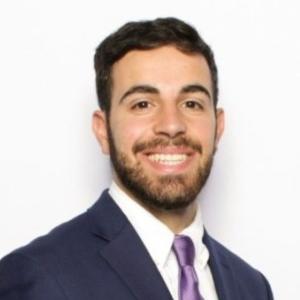
Wealth of Words: New FinTech Course Explores Language-Based AI
Finance may be an industry dominated by numbers but David Pope ’90 believes that words hold the key to creating high-performing portfolios.
Investors are increasingly using AI tools to inform their financial decisions, the lecturer in Finance (and Bentley graduate) explains. He notes that natural language processing (NLP) programs, which recognize and interpret patterns in human speech and text, are proving particularly adept at transforming massive sets of data — gleaned from earnings call transcripts, annual reports, acquisition announcements and other finance-related corporate communications — into actionable insights.
This fall, Pope teamed up with Bentley colleague Tamara Babaian, a professor of Computer Information Systems (CIS), to introduce “Investment Applications of Natural Language Processing” (FT 370), an interdisciplinary course offering students a comprehensive look at the theoretical foundations and practical applications of NLP programs in the finance industry. A required course for students majoring in Financial Technologies (FinTech), it features weekly lab-based sessions that teach students how to create their own machine-learning models using Python, a popular programming language.
According to Pope, these hands-on coding sessions distinguish Bentley from other universities offering FinTech courses. “Having firsthand experience coding NLP programs gives our graduates a deeper understanding of the technology and its applications, and thus a competitive edge,” he explains, noting that the cutting-edge information covered in class is “so new it’s not even in textbooks yet.” Instead, he offers students access to newly released research papers as well as personal and professional insights: Founder and CEO of Speech Craft Analytics — a company using AI to analyze “vocal features that are imperceptible to the human ear” that reveal a speaker’s “true emotional state and intentions hidden within their words” — Pope has more than 30 years’ experience in financial and data analysis.
For the course’s culminating project, he and Babaian tasked students with building their own NLP programs utilizing the Gunning Fog Index (GF), a measure of language complexity based on sentence length and the number of syllables per word. “Executives who use complex language on earnings calls typically do so to obfuscate or delay the release of bad news,” Pope explains, “and as a result, their companies’ stocks underperform.” Based on their programs’ findings, students created portfolios with stocks purchased from companies with lower GF ratings (e.g., simpler language on their earnings calls) — portfolios that “would have outperformed the S&P 1500 by 3.8% each year from January 2011 to June 2023,” he observes.

For students, learning how to leverage AI to boost financial performance has been a game-changer. “It was astonishing to discover how NLP algorithms could discern nuanced patterns and sentiments from corporate managers’ speech and behavior,” says Sandhya Sangappa ’24, an Honors student majoring in Data Analytics and minoring in Business and Mathematics. “Company earnings calls are dense with information, but NLP techniques allowed us to sift through vast amounts of textual data and extract crucial insights we could use to predict investment returns. This project not only showcased the power of NLP in data analysis but also highlighted its relevance in the financial domain, where timely and informed decision-making is paramount.
“I particularly enjoyed the lab sessions with Professor Babaian, which provided a dynamic platform for coding experimentation and problem-solving,” she continues. “Overall, this course reinforced the importance of both independent learning and gaining experience with emerging technologies.”
Gregory Cormier ’23, an Economics-Finance major and CIS minor who graduated summa cum laude in December, agrees. Praising Pope and Babaian for “always pushing us outside our comfort zones and bringing their unique perspectives to every class discussion,” he says that potential employers are “fascinated to hear about my experiences in this course. I can’t even count the number of times I’ve talked about it recently in job interviews. There’s no other course out there like this and being able to show an understanding of AI tools so new to the market is a clear differentiator.”
Both Sangappa and Cormier encourage other students to experience the class for themselves. As Cormier notes, “It’s critical for Bentley to offer hands-on courses focused on AI and fintech, and for students to take advantage of them. After all, these technologies are the future of business.”

